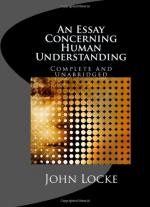|
This section contains 227 words (approx. 1 page at 400 words per page) |

|
Understanding
The understanding is the basic faculty of knowledge that, as Locke says, like the eye, is needed for seeing but does not see itself.
Simple Ideas
Simple ideas are derived directly from experience and cannot be broken down into constituent parts.
Complex Ideas
Complex ideas are, through a variety of different methods, made up of simple ideas.
Secondary Qualities
Secondary qualities are qualities like color or taste that are not things in themselves but, rather, arise from our reaction to those things.
Primary Qualities
Primary qualities are in the objects themselves and are invariant across different experiential modes.
Reflection
Reflection is the faculty that takes ideas directly as an object rather than experience.
Substance
Substance is the presumed basis of all things. It is what all things are ultimately composed of though we do not perceive it directly.
Modes
A Mode is a kind of variation. Modes...
|
This section contains 227 words (approx. 1 page at 400 words per page) |

|




